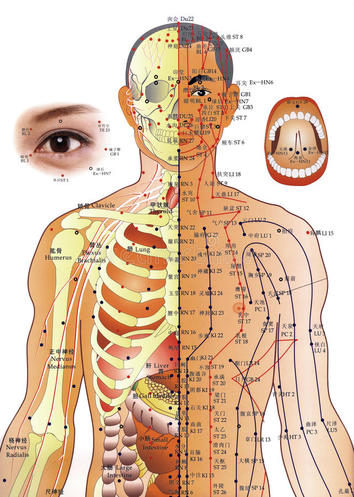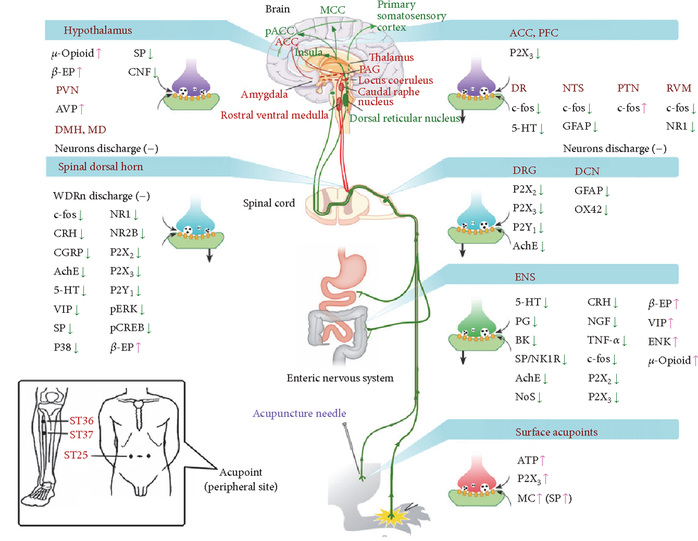HOW DOES ACUPUNCTURE WORK?
According to the National Center for Complimentary and Integrative Health (a branch of the NIH), acupuncture is associated with multiple biological responses. These responses occur both at the point of insertion as well as at at other places in the body. Responses are related to the stimulation of sensory neurons that connect to structures within the central nervous system. This leads to activation of pathways affecting various physiological systems in the brain as well as in the periphery.
One of the major actions of acupuncture's effectiveness is in decreasing inflammation. Physiologically, acupuncture has been found to downregulate pro-inflammatory cells known as M1 macrophages. It also upregulates anti-inflammatory M2 macrophages, which are a source of anti-inflammatory interleuken-10.
Considerable evidence also shows that opioid peptides are released during acupuncture and that the analgesic effects of acupuncture are at least partially explained by their actions. In addition, stimulation with acupuncture activates the hypothalamus and the pituitary gland, resulting in a broad spectrum of systemic effects. Alteration in the secretion of neurotransmitters and neurohormones and changes in the regulation of blood flow, both centrally and peripherally, have been documented. There is also evidence that there are alterations in immune function produced by acupuncture.
Extensive research has been completed about acupuncture's mechanism of action in the treatment of a variety of specific conditions. For example, below is an illustrated summary of the specific biochemical effects of acupuncture when treating for pain modulation in the gastrointestinal system.
One of the major actions of acupuncture's effectiveness is in decreasing inflammation. Physiologically, acupuncture has been found to downregulate pro-inflammatory cells known as M1 macrophages. It also upregulates anti-inflammatory M2 macrophages, which are a source of anti-inflammatory interleuken-10.
Considerable evidence also shows that opioid peptides are released during acupuncture and that the analgesic effects of acupuncture are at least partially explained by their actions. In addition, stimulation with acupuncture activates the hypothalamus and the pituitary gland, resulting in a broad spectrum of systemic effects. Alteration in the secretion of neurotransmitters and neurohormones and changes in the regulation of blood flow, both centrally and peripherally, have been documented. There is also evidence that there are alterations in immune function produced by acupuncture.
Extensive research has been completed about acupuncture's mechanism of action in the treatment of a variety of specific conditions. For example, below is an illustrated summary of the specific biochemical effects of acupuncture when treating for pain modulation in the gastrointestinal system.
For a further in-depth understanding of the biomedical basis of acupuncture, there is an excellent and thorough book on the subject called The Biology of Acupuncture. For links to specific articles and research, take a look at our Related Links page or visit us on Facebook. You can also download this beautifully designed summary of the Scientific Evidence for Acupuncture's Effectiveness, put out by Evidence-Based Acupuncture.
Interested in learning more about Acupuncture?
Check out Our Philosophy, find out more about Five Element Theory, or read about Eastern Medicine.
More questions? Take a look at our FAQ
If you have additional questions, Contact Us.
We're happy to help.
Or Schedule An Appointment Online
Check out Our Philosophy, find out more about Five Element Theory, or read about Eastern Medicine.
More questions? Take a look at our FAQ
If you have additional questions, Contact Us.
We're happy to help.
Or Schedule An Appointment Online



